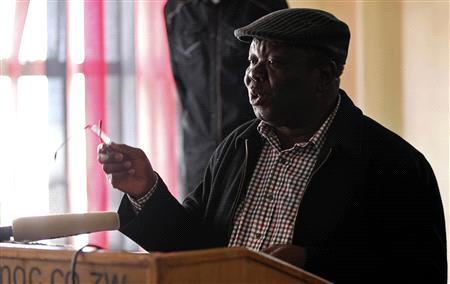Ammon News - HARARE (Reuters) - Prime Minister Morgan Tsvangirai dismissed Zimbabwe's election as a farce on Thursday after his rival President Robert Mugabe's party claimed a landslide victory that would secure another five years in power for Africa's oldest head of state.
Speaking at the headquarters of his Movement for Democratic Change (MDC), a dejected Tsvangirai said Wednesday's vote should be considered invalid because of polling day irregularities and vote-rigging by 89-year-old Mugabe's ZANU-PF party.
"This has been a huge farce," he told reporters. "In our view, that election is null and void." He did not take questions, leaving it unclear whether he or his party would mount any kind of legal challenge.
The conflicting claims from the competing camps came before Zimbabwe's Electoral Commission had issued any official results.
There are fears that an acrimonious post-election dispute could spill over into violence, as happened after the last election in 2008, when 200 MDC supporters were killed in the wake of a first-round defeat for Mugabe, who has ruled since independence from Britain in 1980.
Wednesday's poll was peaceful, but the largest independent observer group said it was seriously compromised because of voter registration problems that might have disenfranchised up to a million people - a fifth of all Zimbabweans of voting age.
Releasing unofficial results early is illegal, and police had said they would arrest anybody who did this.
However, a senior source in Mugabe's ZANU-PF party, who asked not to be named, told Reuters less than 15 hours after the polls closed that the result was already clear.
"We've taken this election. We've buried the MDC. We never had any doubt that we were going to win," the source said.
A vote tally compiled throughout the day by South Africa-based private Zimbabwean channel 1st TV indicated that ZANU-PF had swept the board in the parliamentary vote, with many of the Western-backed MDC's top leadership losing their seats.
The station, using tallies posted at polling stations around the country, said ZANU-PF had won 93 seats in parliament to the MDC's 33, a massive swing from 2008. It was not confident enough to declare the remaining 84 seats.
"I'M NOT DEAD YET"
If confirmed, Mugabe's victory is likely to mean five more years of troubled relations with the West, where the former liberation fighter is regarded as a ruthless despot responsible for serious human rights abuses and wrecking the economy.
Asked on the eve of the polls if he was fit enough to last in office until the age of 94, Mugabe joked about the reports of his imminent death that occasionally surface in the media.
"According to Europe and perhaps America, I died. I don't know how many times I died," he said. "I'm not dead yet."
Western election observers were barred from entering the southern African country, which has rich reserves of minerals such as diamonds, chrome, coal and platinum.
Former Nigerian President Olusegun Obasanjo, head of an African Union (AU) monitoring team, said on Wednesday the polls were "peaceful, orderly and free and fair", and repeated his views on state television after meeting Mugabe late on Thursday.
"I have been able to witness an election that is free and fair as we could see it," he said, delivering an assessment sharply at odds with that of non-government organizations following the poll.
The Zimbabwe Election Support Network (ZESN), the leading domestic monitoring body, said large numbers of people had been turned away from polling stations in MDC strongholds.
It also cast doubt on the authenticity of the voters' roll, noting that 99.97 percent of voters in the countryside - Mugabe's main source of support - were registered, against just 67.94 percent in the mostly pro-Tsvangirai urban areas.
"It is not sufficient for elections to be peaceful for elections to be credible," ZESN chairman Solomon Zwana told a news conference.
SANCTIONS IN BALANCE
Whatever the verdict from the AU and Southern African Development Community (SADC), of which Zimbabwe is a member, the outcome is likely to face intense scrutiny outside Africa.
Britain expressed concern about the lack of pre-election political reforms, echoing earlier fears from Washington that persistent pro-ZANU-PF bias in the state media and partisan security forces made a credible vote impossible.
Given Western sanctions against Mugabe, the view from Brussels, London and Washington is key to the future of Zimbabwe's economy, which is still struggling with the aftermath of a decade-long slump and hyperinflation that ended in 2009 when the worthless Zimbabwe dollar was scrapped.
However, if the vote meets with the broad approval of African regional observers, it will be hard for the West to ignore it without creating a diplomatic ruckus.
"If they step up sanctions, they will have to go on record as rejecting the AU's and SADC's election evaluation, and that will put them in a tight spot politically," said Mark Rosenburg, an analyst at the Eurasia Group political consultancy.
In March, the European Union suspended most sanctions after Zimbabwean voters approved a new constitution limiting presidential powers, opening the way for the July 31 election.
The International Monetary Fund also agreed in June to monitor Zimbabwe's programs until the end of the year, moving Harare a step closer to rescheduling billions of dollars of defaulted debt.
